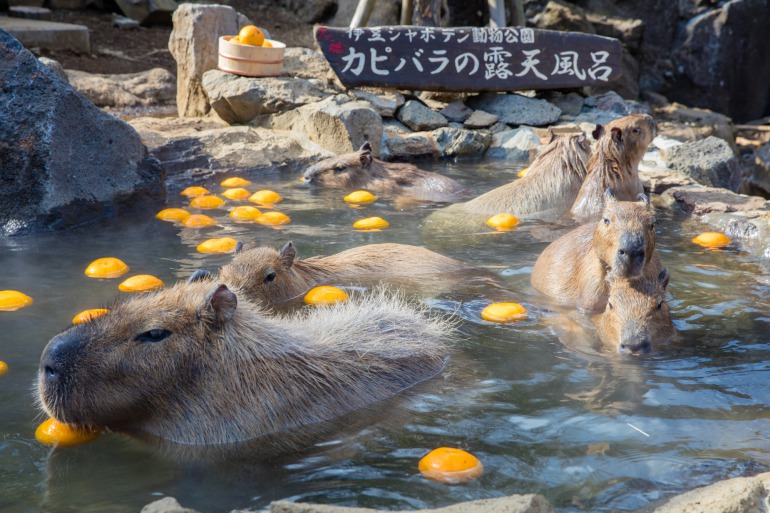Izu Shaboten Zoo, in the city of Ito, Shizuoka prefecture, is a park with a variety of animals and over 1,500 species of succulents from all over the world, including a great number of cacti. This is also the only place in the world where you can go cactus picking.
An Izu Shaboten Zoo specialty is the bathing capybaras, which you can see during the winter months. In fact, Izu Shaboten Zoo is said to be the first place in Japan to start the bathing capybara trend. Here is a peek into Izu Shaboten Zoo and its animals and cacti.
About Izu Shaboten Zoo
Izu Shaboten Zoo opened in 1959. “Shaboten” refers to cacti, and up until the 1960s, the word “shaboten” was used. In recent years, the term “saboten” is commonly used to refer to cacti, but the zoo has kept their name the same since their opening days.
Succulents from all over the world

Golden barrel cacti
At the Izu Shaboten Zoo, there are 1,500 species of succulents throughout the park. They are divided into five different greenhouses.
From cute cacti blooming with flowers to more intimidating, larger cacti, you will find a cactus of your choice!
Mexico Greenhouse
The Mexico Greenhouse is the largest of the five. It is home to 150 species of cacti from Mexico and other parts of North America.
Some of the popular cacti in this greenhouse include the neobuxbaumia polyopha (better known as the cone cactus), which grows up to 8 meters, and the golden barrel cactus. This cactus is one of the largest cone cacti in Japan, and is around 170 years old.
Madagascar Greenhouse
The Madagascar Greenhouse has plants from the island of Madagascar, which lies on the southeastern coast of Africa. Since there are no cacti on Madagascar, the exhibits here are of rare plants on the island, such as special types of aloe and other succulents.
The Allaudia Ascendens can be found in the Madagascar Greenhouse. It is a unique succulent with little, heart-shaped leaves.
Forest Cacti Greenhouse
At the Forest Cacti Greenhouse, there are cacti that can be found in jungles. Many of the cacti grown here do not look like your typical cactus.
One cactus that can be found in the Forest Cacti Greenhouse is the Dutchman’s pipe cactus. This unique cactus blossoms just a few times a year for one night.
South America Greenhouse
In the South America Greenhouse, there are cacti from all over South America. Many of the cacti are big and impressive.
The Notocactus haselbergii, a Brazilian cactus, is grown here. It has white thorns all over, and blossoms a pretty orange flower in the spring.
Africa Greenhouse
There aren’t any cacti in Africa, so the plants displayed in the Africa Greenhouse are other types of succulents. Here, you can see the Dragon’s Blood Tree, which is a huge tree from an island in Yemen.
Cactus picking
You can find the cactus-picking zone after going through the five greenhouses. This is the only place in the world where you can go cactus picking. Buy a pot and pick out your favorite cacti and other succulents, and the staff will make a cute succulent arrangement for you!
Capybara Bath
The birth of the capybara bath

Capybara bath
The capybara bath celebrated its 35th anniversary in 2017. Today, there are many zoos that have the capybara bath, but the Izu Shaboten Zoo was the first to do it. The capybara hot spring started when the zoo employees noticed that the capybaras would huddle together in an area with warm water. During the colder winter months, the capybaras would go into the water puddles, but then come out in an instant since the water was too cold. The capybaras had no choice but to wait until the water got warmer with the weather.
The employees then decided prepared a bath for them during the colder months. It was wildly popular amongst the capybaras, and since then the zoo prepares a bath for the capybaras in the winter and early spring months.
Bathing with the family!

A capybara family bathing together
You can witness the capybara baths between November and April. The capybaras bathe once a day on weekdays and twice a day on weekends and holidays. Many of the capybara bathes with their families.
[Capybara bath schedule 2017 – 2018]
When: Nov. 18, 2017 – Apr. 8, 2018
Time:
・ Weekdays: 1:30p.m. – 2:30p.m.
・ Weekends and holidays: 10:30a.m. – 11:30a.m. and 1:30p.m. – 2:30p.m.
* May vary according to the capybara’s conditions
Other animals at the zoo

Squirrel monkey
There is much more to Izu Shaboten Zoo other than cacti and capybaras! There are a total of 140 species of animals at the zoo.
You can interact with and feed some of the animals. Some species, such as the peacock and squirrel monkey, are let loose throughout the zoo, allowing visitors to see them up close.
Animal Boat Tours

Photo credit: Izu Shaboten Zoo
In the center of the zoo, there is a lake, and in the lake are nine islands. You can tour the islands and see the animals on it by going on the Animal Boat Tour. This is a unique tour that can only be experienced here at Izu Shaboten Zoo.
There are two courses to this tour.
The first is the Around the Lake course, where you listen to the tour guide and go around the lake.
The second is the Monkey Island course, where you can hop on Monkey Island and feed the monkeys. Both tours can be reserved on a first come first served basis.
[Animal Boat Tours]
・ Registration times:
Around the Lake: 9:30a.m. – 4:00p.m.
Monkey Island: 10:00a.m. – 4:00p.m.
* May vary according to season and weather circumstances
・ Registration area:
Parrot Plaza registration area
・ Tour length:
Around the Lake: 15 minutes
Monkey Island: 20 minutes
Animal Shows

Photo credit: Izu Shaboten Zoo
The Animal Shows are held three times a day. Some of the shows are with dogs, parrots, and monkeys, and in some shows humans and animals compete in certain skills.
[Animal Show]
・ Times of the shows:
First show: 11:00a.m.
Second show: 1:30a.m.
Third show: 3:00p.m.
* Each show is approximately 20 minutes.
・ Where: By the chimpanzee area
Try out the Capy-burger

Photo credit: Izu Shaboten Zoo
Inside the zoo, there are a few restaurants and cafes. The Forest Animal Restaurant is especially popular for its cute, photogenic dishes. For instance, this Capy-burger, is made in the shape of a capybara.
Other foods you can enjoy at the zoo include the cactus curry, which uses real cactus. Check out some of the restaurants and cafes while you’re at Izu Shaboten Zoo!
Access
Nearest station: Shaboten-koen シャボテン公園 (Bus stop)
From Tokyo Station
【Tokyo Sta.】Tokaido Shinkansen / for Nagoya
→【Atami Sta.】JR Ito Line / for Ito JR
→【Ito Sta.】Izu Kyuko Line / for Izukyu-Shimoda
→【Izukogen Sta.】Izu Tokai Bus / for Shaboten-koen
→【Shaboten-koen Bus Stop】
From Shizuoka Station
【Shizuoka Sta.】Tokaido Shinkansen / for Tokyo
→【Atami Sta.】JR Ito Line / for Ito JR
→【Ito Sta.】Izu Kyuko Line / for Izukyu-Shimoda
→【Izukogen Sta.】Izu Tokai Bus / for Shaboten-koen
→【Shaboten-koen Bus Stop】
From Mount Fuji Shizuoka Airport
【Shizuoka Airport】Airport Bus / to Shizuoka
→【Shizuoka Sta.】Tokaido Shinkansen / for Tokyo
→【Atami Sta.】JR Ito Line / for Ito JR
→【Ito Sta.】Izu Kyuko Line / for Izukyu-Shimoda
→【Izukogen Sta.】Izu Tokai Bus / for Shaboten-koen
→【Shaboten-koen Bus Stop】
Information
1317-13 Futo, Ito-shi, Shizuoka
0557-51-1111
Mar. to Oct.: 9:00a.m. - 5:00p.m. (last entry at 4:30p.m.) Nov. to Feb.: 9:00a.m. - 4:00p.m. (last entry at 3:30p.m.)
Open year-round
Adults: ¥2300 Elementary school students: ¥1100 Toddlers: ¥400
Unaccepted










_600x400.jpg)















_600x400.jpg)


